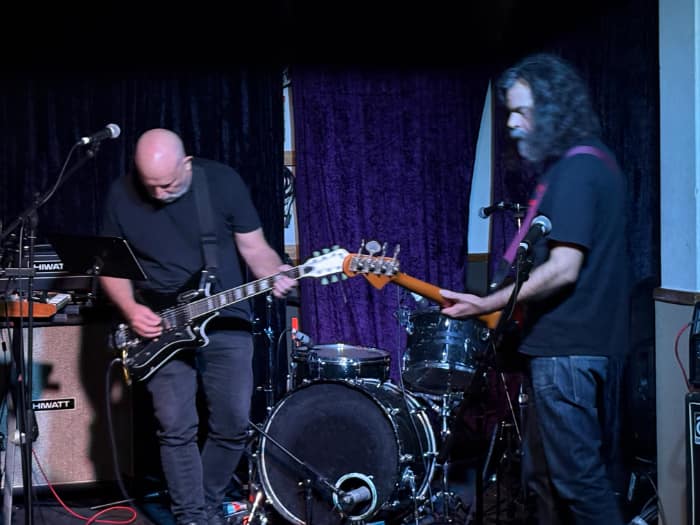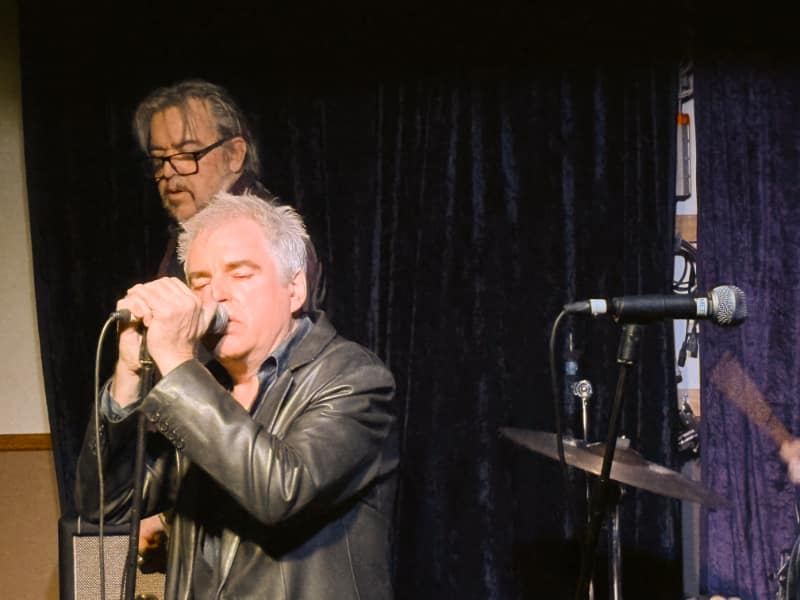Electric Badger have been playing in Adelaide for more than 12 years now, and list their influences on Farcebuk as being "Punk, Funk and Old School Me", while their Bandcamp pages says "members have been involved in previous shared projects ranging in styles from rock, punk, experimental and noise, sound design and even Irish folk. The current band plays hard rock originals reflecting a variety of influences".
Now, while Wikipeedeeay has a perfectly citated entry on “post-punk'” one gets the distinct impression that first, whoever is contributing to the page is well under 45, and second, wasn't reading the music magazines of the day. Why is this important? Because the use of the term “post-punk” implies a familiarity with the history of the period as well as the music.
So, s'cuse me while I lay out my three cups and ball on the table...
What came to be regarded as a huge avalanche of new bands, with new approaches and sounds, really began while their influences were still current. Robert Quine was developing his guitar style during the time he was being blown away by Lou Reed's performances with the Velvet Underground, for example. On the 4th of June at the Lesser Free Trade Hall in Manchester The Sex Pistols famously influenced a room of folks who went on to form other bands .
Okay. After the Bill Grundy Incident on 1st December 1976, the inkies - the music press comprising the New Musical Express, Melody Maker and Sounds were regularly using the term 'new wave' to describe the unexpected avalanche of new and very, very different music now pouring through the floodgates.
Apparently Nick Kent and Dave Marsh were using the term earlier in the 1970s in descriptions of the Velvet Underground and the New York Dolls. I have no idea, and don't much care. During 1974-1975 or so, there was a burgeoning wave of original and unique bands developing in New York. You could call that a new wave, sure.
But what happened in UK after The Grundy Skit was that the term “new wave'” would be used in a kind of scattergun way, much like “woke” is today. That is, it means very different things to different people. Some journos took the view that “new wave” essentially meant “bands which had been directly influenced by the Sex Pistols”.
Others took the view that it meant any distinctively new music. Others again came to think of it in the way that Wikipedia mistakenly refers to it today: "Later, critical consensus favored ‘new wave’ as an umbrella term involving many contemporary popular music styles, including synth pop, alternative dance and post-punk. The main new wave movement coincided with late 1970s punk and continued into the early 1980s"
Needless to say, that ain't how I recall it at all. The term fell into deserved disuse; mostly due to hopeless inaccuracy and the obvious rise of other genres during the late 1970s and early 1980s: mod, ska, rude boy, skin and punk all became distinctive genres.
Wikipeepants again: "Post-punk is a diverse genre that emerged from the cultural milieu ofbpunk rock in the late 1970s. Originally called "new musick", the terms were first used by various writers in the late 1970s to describe groups moving beyond punk's template and into disparate areas".
Yeah, righto: what horseshit. One trouble with this is that there were a pile of bands which predated the Bill Grundy Debacle; Rocket from the Tombs giving birth to Pere Ubu and the Dead Boys would've fitted neatly into Kent'n'Marsh's definition of 'new wave', but would have also been thought of in the UK as new wave in the Brit sense, as well as "post-punk".
 The Cold Field get their Joy Division vibe on.
The Cold Field get their Joy Division vibe on.
Another problem with this definition is that the first punk band to appear in any broadly-comprehended sense were the Sex Pistols, a bunch of would-be rock 'n' rollers who loved the Faces and Bowie (not 'garage rock'), with a highly literate and malevolent oik as a vocalist. At the early gigs, before their international exposure on Grundy's Fifteen Minutes (or whatever his show was called), Lydon called upon the crowd to form their own bands.
And many did - some (see the link above) becoming household names in the UK, while many others did not. Most UK punk bands didn't have a “garage rock” template; their influences were indeed complex but prominently included the wall of sound pop of Phil Spector, and the last big popular musical movement, Glam. Glitter, Slade, Mud, Wizzard ... and, sure, The Ramones were in there from 1976 onwards as well. One UK band which did use garage rock as a template were The Barracudas, which were closer to pop than punk, and couldn't really be described as “new wave” in any sense.
The problem with “punk” in the UK sense is that the journos wanted to write it off because it didn't impress them all that much, and for many years despaired of the actual popularity of outfits such as Cockney Rejects, Discharge, The Exploited, The Anti-Nowhere League, Crass and so forth.
Another Wikifart entry discloses that other punk groups "included Subway Sect, Alternative TV, Wire, the Stranglers, Eater and Generation X. Farther afield, Sham 69 began practicing in the southeastern town of Hersham. In Durham, there was Penetration, with lead singer Pauline Murray."
Well, no. ATV and Wire were lumped in with the New Wave and confused the journos: they weren't considered punk at all. The Stranglers were extant long before punk happened, and not only never considered themselves “punk”, they never considered themselves 'new wave' (although the journos did). Eater, yes, were a punk outfit.
Generation X were a “new wave” band, although you could make a case for Idol et al being in much the same situation as Cook, Jones and Matlock of the Sex Pistols: hoping for fame, dosh, Lamborghinis, champers and birds. Needless to say, Idol achieved that after ditching Gen X. Sham 69 were nominally a punk band with a load of horrible right-wing skinhead dickheads attached (their singles are damn good modern pop, though).
And Penetration were a rock band, and again, you could lump them in with 'new wave', but it would be a stretch. Siouxsie and the Banshees were not punk but a new wave band, no question. But Public Image were neither, not really. See?
This confusion over what constituted “new wave” caused the term in the music mags to disperse as other, more clearly defined, genres rose, including “synth-pop” (which again Wiki thinks is “post punk” or “new wave”).
One of the problems with using AI is that it fucking trawls places like Wikipedia and a slew of other websites making a vast assortment of tosh; the Wiki pages I've used (no, fuck the links, find the references yourself) refer to a variety of books, and while many of these have much truth, they're often inaccurate. Jon Savage's "England's Dreaming" is, I think, massively inaccurate and grossly distorts the UK history of the movement (what became “punk” and “new wave” was considered a movement by every participant, whether they be photographer, musician or punter), partly because he seems to have taken on board Westwood and McLaren's equally distorted perspectives. I've yet to see a definitive book on the Sex Pistols - nothing like it, unfortunately. We need a Mark Lewisohn character to emerge to put it all together.
And “punk” hasn't really meant “punk” as a lifestyle as far as I can tell since about 1986. I don't know if you recall the TV adverts which used proudly bedecorated punks - and made them look like idiots? Around that time, the decorations began to dwindle. The only time you see the peacockery these days is at significant gigs when either they emerge from the woodwork or decide to dress up for the night. Rather like an office theme party, really.
Today, assorted twats (and the algos on the music platforms) are still - seriously - using the term “post-punk”. Which means, frankly, nothing. Most bands these days aren't “moving on” from their “punk roots”; they never had any. And as the Wiki indicates, the variety and scope of so many bands using the term simply renders such a definition to be meaningless. I mean, if the later 'harder' Skyhooks re-emerged as a direct reaction to punk were they 'post-punk'? No, they were desperate for attention. Or, if Leo Sayer or Air Supply launched comebacks, would they be referred to as “post-punk”, FFS?
So. Any chance we can all just quietly forget the term “post-punk” ever existed? Please?
Righto, having splurked all that, Electric Badger are a rock'n'roll band with a pile of influences which provide a decent broad palette. You'll dig them, no two songs are the same, and they have some absolute stompers in their set. Seek them out.
The Cold Field shocked the bejesus out of me. While Joy Division is often mentioned as a band's “influence”, very few bands actually use JD as a starting point, at all. Alright, Melbourne's Adjustment Disorder do in a few songs, but not by any means all. What makes The Cold Field so damn good is, first, they absolutely inhabit JD's landscape without echoing or mimicking it. Sure, they're not going to be as powerful, nor are they doing to upset the musical underground's applecart in the way that JD did when Curtis unwisely hung himself, but that doesn't matter.
The songs are strong, unique, moving and tuff. They'll take you places. They're gutsy enough to have made actual LPs, too. I loved them! Here's a link.
The Velvet Parade ... were fucking sensational. I really don't want to bang on about them - you need to discover them yourself. The recent EP highlights a particular aspect of them ... and is does not prepare you for the big actuality, the visceral physicality.
The band are deep tight rock 'n' roll band with a broad, commercial cross-over palette, who are having fun while interacting with themselves and us, and Rip Hood is one of Australia's great showmen. Bags of energy, connection and a ball of power. If you have the opportunity to see them, and don't take it, you may as well have got drunk yesterday and voted for that prick Palmer “as a joke”. I'm serious, don't miss The Velvet Parade. At all.
I'll say this, too. Amyl and the Sniffers deserve their success - they've worked themselves hard for it, and managed to get a lot of attention, and their live shows look like a blast.
The Velvet Parade deserve just as much or more, simply because their songs are, to my ears, better. And I know which outfit I'd rather see headlining festivals overseas.

 Ripley Hood fronts Velvet Parade.
Ripley Hood fronts Velvet Parade.